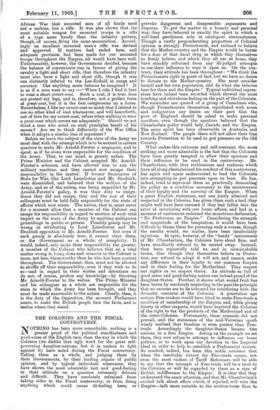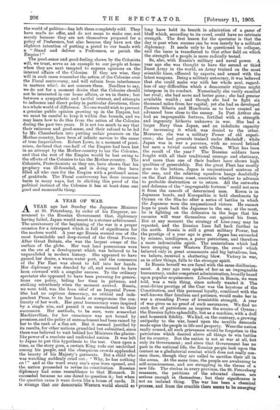THE COLONIES AND THE FISCAL CONTROVERSY.
NOTHINOTHING has been more remarkable, nothing is a NG proof of the political steadfastness and 'good-sense of the English race, than the way in which the Colonies (we dislike that ugly word for the great self- governing daughter-nations, but it is useless to fight 'against it) have acted during the Fiscal controversy. 'Taking them as • a whole, and judging them by their Governments, by their leading organs of public opinion, and by typical individual utterances, they have shown the most admirable tact and • good-feeling in their attitude on a question extremely delicate and ' difficult: They have resolutely refrained from taking sides in the. Fiscal controversy, or from doing -anything which could cause ill-feeling here, or provoke dangerous and disagreeable arguments and disputes. To put the matter in a homely and personal way, they have behaved in exactly the spirit in which a well-bred gentleman acts in analogous circumstances. Though a vastly preponderating proportion of Colonial opinion is strongly Protectionist, and inclined to believe that the Mother-country and the Empire would be bettir for a dose of that fiscal drug in which they . themselves so firmly believe, and which they all use at home, they have steadily refrained from any ill-judged attempts to use their influence to urge it upon us. On the con- trary, their attitude has been throughout : " We think the Protectionists right in point of fact, but we have no desire to dictate to the Mother-country. She must consider herself and her own population, and do what she believes best for them and the Empire." Typical individual expres- sions have indeed been recorded which showed the most touching and chivalrous feeling on the part of the Colonists. We remember one quoted of a group of Canadians who, though Protectionists themselves, repudiated with scorn and indignation any desire on their part that the poor of England should be asked to make personal sacrifices, even though the speakers believed that the Chamberlain policy would help Canada and the Empire. The same spirit has been observable in Australia and New Zealand. The people there will not allow their bias towards Protection to be used to put pressure on the Old Country.
What makes this reticence and self-restraint the more striking and more admirable is the fact that the Colonists have been greatly tempted to allow their opinions and their influence to be used in the controversy. Mr. Chamberlain, with that recklessness and rashness which have all along characterised his conduct of this controversy, has again and again endeavoured to lead the Colonists into attempting to put pressure upon us here. Ho has, indeed, tried to represent them as practically demanding his policy as a condition necessary to the maintenance of their loyalty and the survival of the Empire. When a great English statesman, and one justly admired and respected in the Colonies, has given them such a lead, they might well have been excused if they had fallen into the error of interfering with our home affairs, and had in a moment of excitement endorsed the monstrous declaration, " No Preference, no Empire." Considering the strength and magnitude of the temptation, it would have been difficult to blame them for pursuing such a course, though the results would, we realise, have been incalculably injurious. In spite, however, of the " heady " incitements of Mr. Chamberlain, the Colonies have stood firm, and have steadfastly refused to be carried away. Instead, they have repeatedly told us, and in unmistakable terms, that though they themselves believe in Protec- tion, our refusal to adopt it will not, and cannot, make any difference in their loyalty to our common Empire and in their feeling for the Motherland. They respect our rights as we respect theirs. An attitude so full of good-sense and good-feeling makes one indeed proud of the daughter-States. Further, it shows what sound fruit has been borne by resolutely respecting in the past the principle that no excuses are to be tolerated for interfering with the domestic concerns of the Colonies. A generation ago certain Free-traders would have liked to make Free-trade a condition of membership of the Empire, and, while giving liberty in other respects, would have deprived the Colonies of the right to tax the products of the Motherland and of the sister-Colonies. Fortunately, these counsels did not prevail, and the statesmen of the mid-Victorian epoch wisely realised that freedom is even greater than Free- trade. Accordingly the daughter-States became free nations in a free Empire. Acting on the example we set them, they now refuse to attempt to influence our home politics, or to work upon our devotion to the Imperial ideal in order to help to establish a Preferential system. So marked, indeed, has been this noble reticence that when the inevitable victory for Free-trade comes, not even the most violent of Tariff Reformers will be able to say that the triumph of Free-trade will be a snub to the Colonies, or will be regarded by them as a sign of British indifference to the Empire. It is clear that they understand the exact situation, and that Mr. Chamberlain's excited talk about offers which, if rejected, will ruin the Empire—talk more suitable to the auction-room than to the world of politics—has left them completely cold. They have made no offer, and do not mean to make one, not merely because they are not themselves prepared for a policy of Preference, but also because they have not the slightest intention of putting a pistol to our heads with a " Stand and deliver a Preference, or perish the Empire ! "
The good-sense and good-feeling shown by the Colonists will, we trust, serve as an example to our people at home when they are next tempted to express opinions on the internal affairs of the Colonies. If they are wise, they will in such cases remember the action of the Colonies over the Fiscal controversy, and will refrain from interference in matters which do not concern them. Needless to say, we do not for a moment desire that the Colonies should not be interested in our home affairs, or we in theirs ; but between a sympathetic and tactful interest, and attempts to influence and direct policy in particular directions, there is a whole world of difference. No one would wish to prevent a genuine public opinion growing up in the Empire, but we must be careful to keep it within due bounds, and we may learn how to do this from the action of the Colonies during the past two years. It is not too much to say that their reticence and good-sense, and their refusal to be led by Mr. Chamberlain into putting unfair pressure on the Mother-country, have been of infinite service to the cause of true Imperialism. Robert Lowe, in a moment of pessi- mism, declared that one-half of the Empire had been lost in an attempt by the Mother-country to tax the Colonies, and that the rest of the Empire would be lost owing to the efforts of the Colonies to tax the Mother-country. The Colonists, Protectionists as they are, have shown that his prophecy was ill-founded, and in doing so they have filled all who care for the Empire with a profound 'sense of gratitude. The Fiscal controversy has done immense harm in many ways, but in eliciting this proof of the political instinct of the Colonies it has at least done one good and memorable thing.







































 Previous page
Previous page